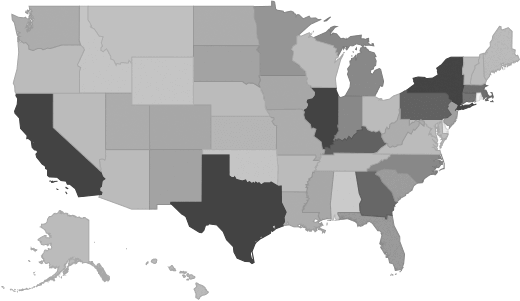Refrigerated Warehousing & Storage Industry - Market Research Report
Industry Overview
This industry comprises establishments primarily engaged in operating refrigerated warehousing and storage facilities. Establishments primarily engaged in the storage of furs for the trade are included in this industry. The services provided by these establishments include blast freezing, tempering, and modified atmosphere storage services.
Source: U.S. Census BureauMarket Size and Industry Forecast
This research report analyzes the market size and trends in the Refrigerated Warehousing and Storage industry. It shows overall market size from 2020 to the present, and predicts industry growth through 2030. Revenues data include both public and private companies.
| Historical | Forecasted |
|---|
| 2020 | 2021 | 2022 | 2023 | 2024 | 2025 | 2026 | 2027 | 2028 | 2029 | 2030 |
|---|
| Market Size (Total Revenue) | Included in Report |
| % Growth Rate |
| Number of Companies |
| Total Employees |
| Average Revenue per Company |
| Average Employees per Company |
Source: U.S. government financial dataIndustry Revenue ($ Billions)

Industry Forecast ($ Billions)

Advanced econometric models forecast five years of industry growth based on short- and long-term trend analysis. Market size includes revenue generated from all products and services sold within the industry.
Geographic Breakdown by U.S. State
Market size by state reveals local opportunity through the number of companies located in the region. Each state's growth rate is affected by regional economic conditions. Data by state can be used to pinpoint profitable and nonprofitable locations for Refrigerated Warehousing & Storage companies in the United States.
Refrigerated Warehousing & Storage Revenue by State

Distribution by Company Size
| Company Size | All Industries | Refrigerated Warehousing & Storage |
|---|
| Small Business (< 5 Employees) | Included |
| Small Business (5 - 20) |
| Midsized Business (20 - 100) |
| Large Business (100 - 500) |
| Enterprise (> 500) |
Refrigerated Warehousing & Storage Industry Income Statement (Average Financial Metrics)
Financial statement analysis determines averages for the following industry forces:
- Cost of goods sold
- Compensation of officers
- Salaries and wages
- Employee benefit programs
- Rent paid
- Advertising and marketing budgets
The report includes a traditional income statement from an "average" company (both public and private companies are included).
| Industry Average | Percent of Sales |
|---|
| Total Revenue | Included |
| Operating Revenue |
| Cost of Goods Sold (COGS) |
| Gross Profit |
| Operating Expenses |
| Operating Income |
| Non-Operating Income |
| Earnings Before Interest and Taxes (EBIT) |
| Interest Expense |
| Earnings Before Taxes |
| Income Tax |
| Net Profit |
Average Income Statement

Cost of Goods Sold
Salaries, Wages, and Benefits
Rent
Advertising
Depreciation and Amortization
Officer Compensation
Net Income
Financial Ratio Analysis
Financial ratios allow a company's performance to be compared against that of its peers.
| Financial Ratio | Industry Average |
|---|
| Profitability Ratios | Included |
| Profit Margin |
| ROE |
| ROA |
| Liquidity Ratios |
| Current Ratio |
| Quick Ratio |
| Activity Ratios |
| Average Collection Period |
| Asset Turnover Ratio |
| Receivables Turnover Ratio |
| Inventory Conversion Ratio |
Products and Services Mix
Product lines and services in the Refrigerated Warehousing & Storage industry accounting for the largest revenue sources.
| Product Description | Description | Revenue
($ Millions) |
|---|
| Industry total | Included |
| Warehousing services |
| Warehousing services - storage of goods |
| Warehousing services - handling of goods |
| Warehouse specialty services |
| Trans of clim-contld box & pallet gds except intermdl tank conts, rd |
| Drayage |
| Other products |
| Trans of climate-controlled intermodal containers by road |
| Domestic freight transportation arrangement service |
Salary information for employees working in the Refrigerated Warehousing & Storage industry.
| Title | Percent of Workforce | Bottom Quartile | Average (Median) Salary | Upper Quartile |
|---|
| Management Occupations | 3% | Included |
| Chief Executives | 0% |
| General and Operations Managers | 1% |
| Office and Administrative Support Occupations | 22% |
| Material Recording, Scheduling, Dispatching, and Distributing Workers | 15% |
| Shipping, Receiving, and Traffic Clerks | 6% |
| Shipping, Receiving, and Traffic Clerks | 6% |
| Stock Clerks and Order Fillers | 8% |
| Stock Clerks and Order Fillers | 8% |
| Transportation and Material Moving Occupations | 63% |
| Motor Vehicle Operators | 7% |
| Driver/Sales Workers and Truck Drivers | 7% |
| Material Moving Workers | 51% |
| Industrial Truck and Tractor Operators | 15% |
| Industrial Truck and Tractor Operators | 15% |
| Laborers and Material Movers, Hand | 36% |
| Laborers and Freight, Stock, and Material Movers, Hand | 27% |
| Packers and Packagers, Hand | 7% |
Government Contracts
The federal government spent an annual total of
$501,086,034 on the refrigerated warehousing & storage industry. It has awarded 93 contracts to 36 companies, with an average value of $13,919,056 per company.
Top Companies in Refrigerated Warehousing & Storage and Adjacent Industries
| Company | Address | Revenue
($ Millions) |
|---|
Included |



